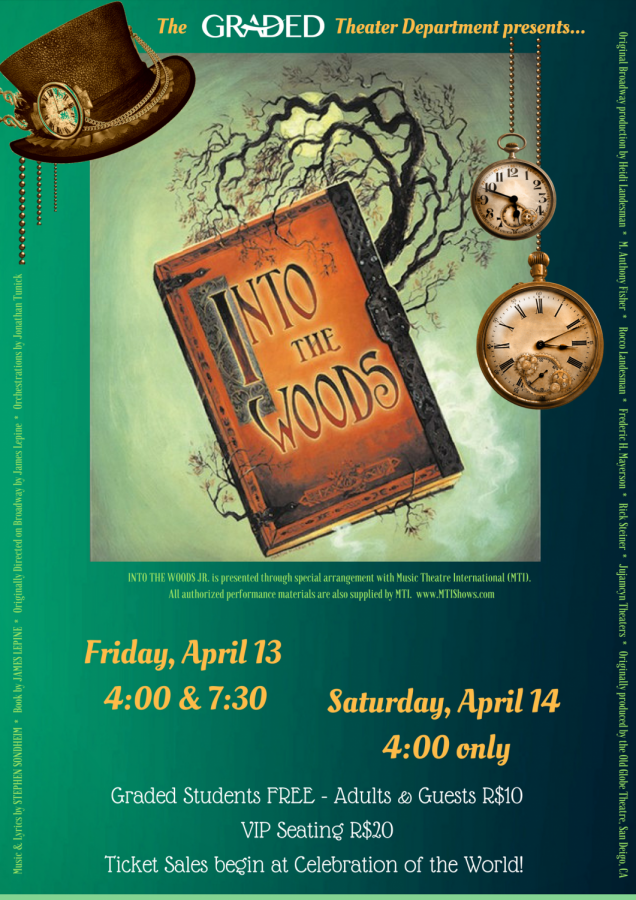Stephen Sondheim: The legend behind the lyrics
This Friday and Saturday, the Graded Theatre Department will be performing one of Stephen Sondheim’s most famous works: Into the Woods! The musical is a 1980s collaboration between playwright and director James Lapine and Stephen Sondheim and is one that has for sure rattled many crowds. The musical depicts a variety of classic fairytale plots, all connected through the symbolism of the woods. The full version of the show shows a perfect first half, where happy ever after is sung over and over again. The second (mostly) half wipes it all away; the fairytale plot is deleted, and it shows the reality of our world. Due to rights and regulations, however, the Graded Theatre Department will be performing the junior version of the musical. This is only the first half of the musical, which depicts the happy endings. The purpose of the original version, however, is that it teaches the audience the world isn’t fair, and definitely not like a fairytale. That is why the director of the show, Ms. Grimes, will be characterizing the show as: things are not as they seem. This will allow the production to still bring back elements from the full-length musical, and adding it to the junior musical.
Did you know, that the majority of episode titles of Desperate Housewives refer to Stephen Sondheim’s song titles or lyrics? You have probably heard of the famous composer and lyricist due to West Side Story, Sweeney Todd, and this semester’s musical production ‘Into the Woods’. These musical-masterworks were all co-created by Sondheim, who has had a remarkable career in the theatrical world. His name is legendary for its quirky, imaginative, and engaging musicals, which have left many audiences speechless and wanting more.
Stephen Sondheim began his career with an interest in music and a passion to create. He came in touch with music and theatre through friends and school, and he took piano and organ classes in his youth. Sondheim wrote his first musical, a satire, about his school in his teenage years, as well as working on 1947’s Allegro, a musical composed partially by Richard Rodgers (for those of you who do not know him, he wrote the music for The Sound of Music and more). Sondheim majored in music at Williams College, and after his graduation, he further studied with avant-garde composer Milton Babbitt. In the early 50s, he went to Los Angeles and began writing scripts for television, which then led him to New York where he composed songs (the background-music-type) for plays. Becoming part of the theatre world got Sondheim in contact with directors, choreographers, and other composers. Soon he got news of Leonard Bernstein (composer) and Jerome Robbins (choreographer), who were looking for a lyricist for West Side Story, a contemporary musical adaptation of Romeo and Juliet. Sondheim became a crucial part of the production of the musical, and the show opened in 1957. After having been adapted for the screen, it still is one of Broadway’s biggest hits. For Sondheim, this meant a Broadway breakout just happened, and his name was now known in the theatrical world.
Working on one stand-out musical, however, is not how one becomes a Broadway legend. Sondheim built up his reputation through years of writing, composing, and imagining up the tunes that would best fit a musical. He collaborated with many writers and directors over the years to create more musicals. The composer has won an Academy Award and a grand total of eight Tony Awards, including a Special Tony Award for Lifetime Achievement in the Theatre. Remarkably, Sondheim was also honored as a recipient of the Presidential Medal of freedom in November of 2015. Just last year, he was also awarded the PEN/Allen Foundation Literary Service Award, one given only to a “critically acclaimed writer whose body of work helps us understand and interpret the human condition.” Sondheim is the first composer-lyricist to win this award. A reason for winning this award, as Michael Kors says, is because “his writing cut to the core of human feelings and also represented something that was sophisticated and playful at the same time.”
The legendary lyricist is reaching his 90s now, but his legacy still goes on. In 1981, Sondheim founded Young Playwrights Inc. to introduce young people to writing for theatre. Additionally, there is also the Stephen Sondheim Center for the Performing Arts, which will continue encouraging young theatricals to pursue in careers relating to the stage, and The Stephen Sondheim Society which is aimed at continuing to honor Sondheim’s career. Apart from this, his musicals will be performed for many years to come, and the movie adaptations will be watched just the same.
Sources: Biography.com, The New York Times, The Guardian

Rosanne has been a part of The Talon as an Entertainment writer, Features editor, and now as an Editor-in-Chief with Nadya. She has spent countless hours...









